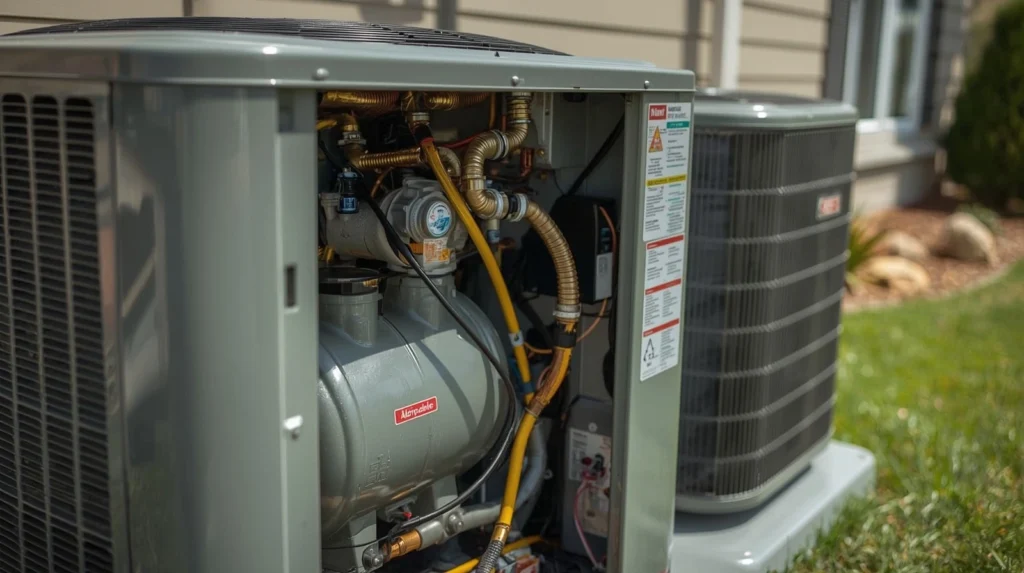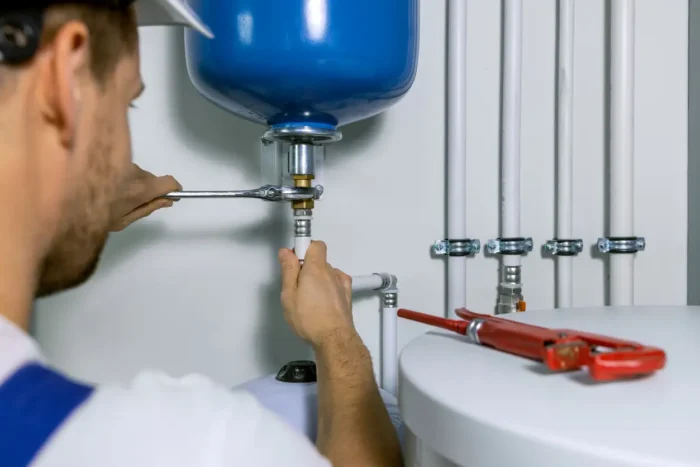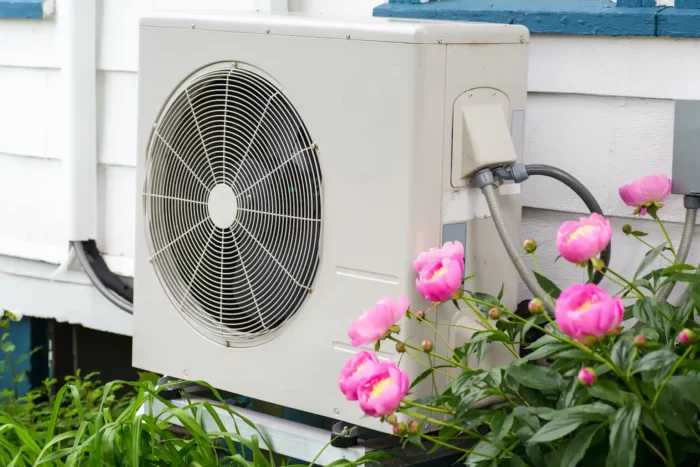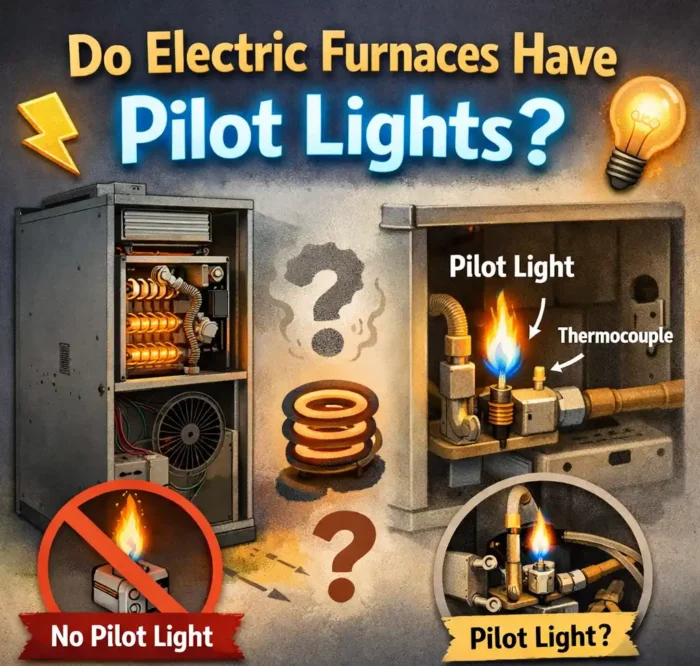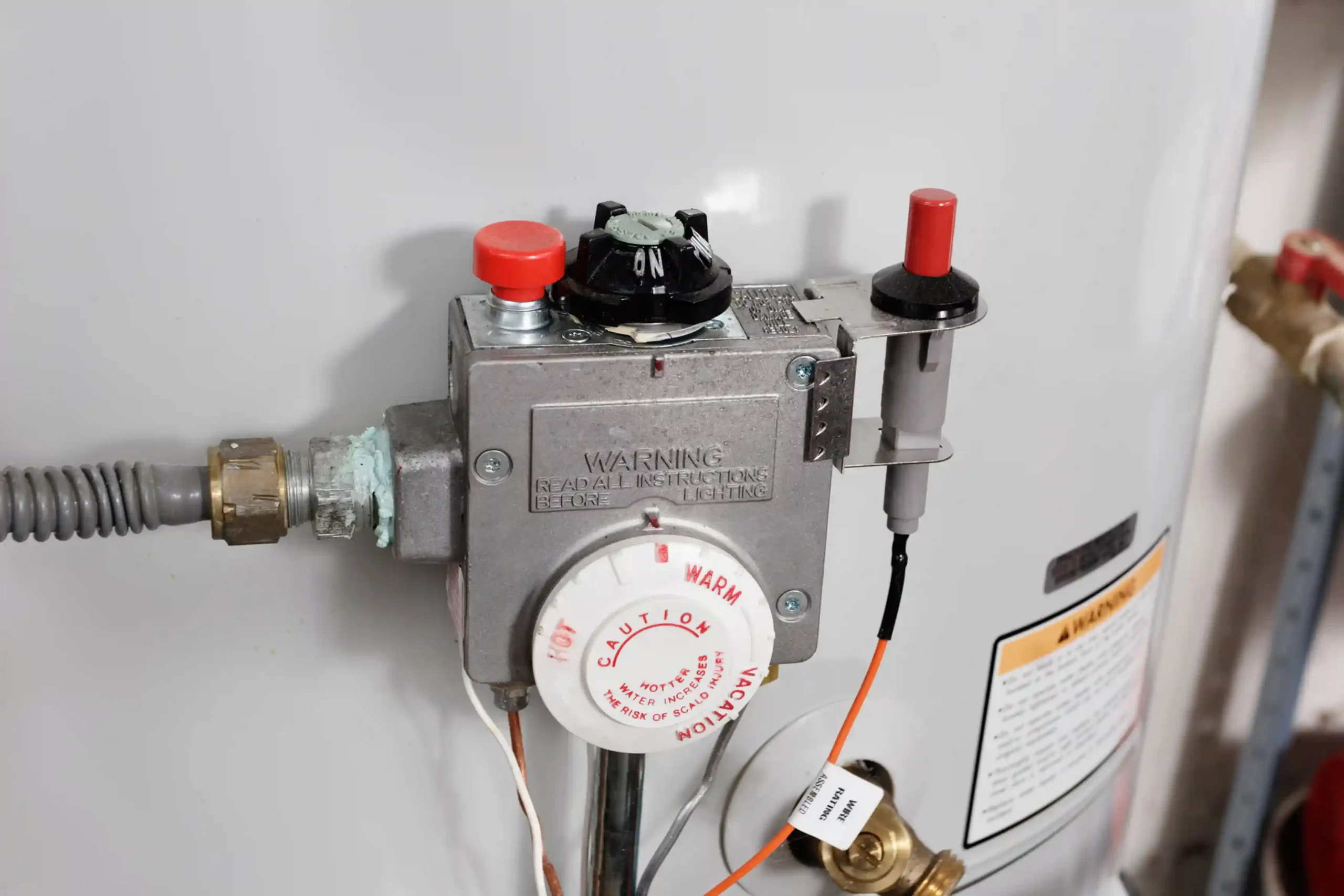When it comes to air conditioning, most people are familiar with the cool air that flows from their vents, but few understand the inner workings of the components that make this possible. Two of the most crucial components of an air conditioning system are the compressor and condenser. While both are essential in the cooling process, they have very different roles. In this article, we’ll dive deep into the compressor vs condenser debate, explain their functions, and clarify how each contributes to the overall performance of an AC unit. By the end of this article, we will discuss the query condenser vs compressor and better understanding of these essential components and tips for maintaining them.
Table of Contents
ToggleWhat is an Air Conditioner Compressor
The compressor is often considered the heart of an air conditioning unit. Its job is to pump refrigerant throughout the system, initiating the cooling process. Simply put, the compressor compresses the refrigerant gas, turning it into a high-pressure, high-temperature gas. This refrigerant will eventually cool down and undergo the rest of the refrigeration cycle.
Definition and Function of the Compressor
Think of the compressor as the engine of the system, without it, the refrigerant wouldn’t circulate, and the cooling process wouldn’t even begin. It works by compressing the refrigerant gas and sending it to the condenser, where it will lose its heat and turn into a liquid. The compressor is generally housed inside the outdoor unit of the AC, though it can vary with the system design.
Types of Compressors in Air Conditioning
There are several types of compressors used in air conditioning systems:
Reciprocating Compressors: These are the most common in residential air conditioners. They use a piston that moves back and forth to compress the refrigerant.
Scroll Compressors: Known for their quiet operation and energy efficiency, scroll compressors are often found in high-end units.
Screw Compressors: More common in larger commercial systems, these compressors use a helical screw mechanism to compress the refrigerant.
Signs of a Faulty AC Compressor
When the compressor begins to fail, you might notice several signs:
Unusual noises like grinding or clicking
Reduced cooling efficiency
Increased energy bills due to inefficient operation
Overheating or a unit that doesn’t turn on at all
Want to Learn More About AC Compressors?
Dive deeper into how your AC compressor works, its types, and maintenance tips in our detailed guide.
What is an Air Conditioner Condenser
While the compressor starts the cooling cycle, the condenser plays a critical role in releasing the heat that the compressor has just created. The condenser allows the refrigerant to cool down and change from a high-temperature gas to a cooler, high-pressure liquid. It does this by releasing the heat into the surrounding air.
Definition and Function of the Condenser
The condenser is the heat exchanger of the system, responsible for transferring the excess heat out of the refrigerant. Located in the outdoor unit of the air conditioner, it consists of coils that allow the refrigerant to cool. It’s through this process that the refrigerant undergoes its phase change, helping to maintain the AC system’s cooling efficiency.
Types of Condensers in AC Systems
There are two main types of condensers:
Air-cooled Condensers: These are the most common and use ambient air to cool down the refrigerant. They are typically found in residential air conditioners.
Water-cooled Condensers: These are more efficient and used in larger, industrial systems. They rely on water to absorb the heat from the refrigerant.
Signs of a Faulty Condenser
A failing condenser can cause a variety of problems, including:
Warm air coming from the AC instead of cool air
Increased humidity levels in the room
Ice buildup on the condenser coils
A reduction in airflow or noticeable leaks around the outdoor unit
Want to Learn More About AC Condenser?
Discover the role of the AC condenser, how it functions, and tips to keep it running efficiently in our detailed guide.
Key Differences Between AC Compressor and Condenser
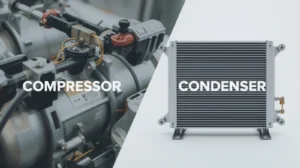
Now that we have a better understanding of each component, let’s take a closer look at how the compressor and condenser differ in their functions.
Roles and Functions in the Refrigeration Cycle
The compressor works by compressing the refrigerant and moving it through the system to the condenser.
The condenser’s job is to allow the refrigerant to release the heat it has absorbed and cool it down, turning it back into a liquid so the process can continue.
Location in the AC Unit
Both the compressor and condenser are typically located in the outdoor unit of the air conditioner. However, the compressor sits at the core of the unit, where it works the hardest. The condenser, on the other hand, acts as the heat exchanger, often surrounded by coils or fins designed to increase surface area and facilitate cooling.
Heat Transfer Process
The compressor and condenser work together as part of the heat exchange process. The compressor compresses the refrigerant and sends it to the condenser, which then releases the heat into the outside air. Without the condenser properly cooling the refrigerant, the cooling cycle would be ineffective.
How Compressor and Condenser Work Together in Air Conditioning
The compressor and condenser are two of the most important players in an air conditioning system’s refrigeration cycle. Let’s break down the entire cycle:
The compressor compresses low-pressure refrigerant gas into high-pressure gas.
The refrigerant gas travels to the condenser, where it cools and condenses into a liquid.
The refrigerant then travels through the expansion valve, where it loses pressure.
The low-pressure liquid refrigerant moves through the evaporator coils, cooling the air in your home.
Impact of Compressor and Condenser Efficiency on AC Performance
The efficiency of both the compressor and condenser directly affects the cooling power and energy efficiency of your air conditioner. A worn-out compressor or a dirty condenser coil can significantly reduce the effectiveness of your AC unit, leading to higher electricity bills and inconsistent cooling.
Common Problems When Compressor and Condenser Fail to Work Properly
If either the compressor or condenser is malfunctioning, the AC will struggle to cool effectively. Leaking refrigerant, blocked condenser coils, or a broken compressor can result in poor cooling performance, increased wear on the system, and potentially more expensive repairs down the line.
Common Problems with Compressors and Condensers
As an air conditioning technician, I’ve encountered my fair share of issues with compressors and condensers. Here’s a rundown of common problems to look out for.
Signs of a Failing Compressor
The unit makes strange noises or fails to turn on.
The air conditioner doesn’t cool as it should.
A sudden increase in energy usage.
Signs of a Failing Condenser
Reduced airflow from the unit.
Visible ice buildup around the coils.
Leaks or visible damage to the condenser coils.
How to Troubleshoot and Fix Issues
If you’re experiencing issues with your compressor or condenser, the first step is to call a professional HVAC technician. However, here are a few things you can try:
For the compressor: Check if the circuit breaker has tripped and reset it. If the issue persists, the compressor might need replacement.
For the condenser: Make sure the condenser coils are clean and free from debris. If they are clogged, it can prevent the system from cooling effectively.
Importance of Proper Maintenance for Both Compressor & Condenser
Taking care of your compressor and condenser is crucial to the longevity and efficiency of your air conditioner. Regular maintenance is key to ensuring both components continue to function optimally.
Routine Maintenance Practices
Routine AC maintenance should include cleaning the compressor and condenser coils, checking refrigerant levels, and inspecting for any signs of wear and tear. Cleaning the condenser coils prevents them from getting clogged with dirt and debris, allowing the system to expel heat more effectively.
Preventive Measures to Extend the Life of Both Components
Replace air filters regularly.
Ensure the unit is free from debris that could block airflow.
Schedule annual professional maintenance checks.
How Regular Maintenance Affects AC Efficiency and Longevity
With proper maintenance, you can extend the life of your compressor and condenser. Clean components run more efficiently, reducing wear and tear and increasing the overall performance of your air conditioning unit.
Choosing the Right AC Unit
When purchasing a new air conditioning system, consider the following:
Efficiency ratings: Look for an AC unit that uses an energy-efficient compressor and condenser to save on electricity bills.
Size and capacity: Ensure that the unit is appropriately sized for your home. An undersized unit will strain the compressor and condenser.
Brand reputation: Choose a brand known for high-quality compressors and condensers, such as Trane, Carrier, or Daikin.
Conclusion
Understanding the compressor vs condenser debate is crucial for anyone using an air conditioning unit. Both components play distinct but interconnected roles in the refrigeration cycle, ensuring that your AC cools effectively and efficiently. By taking good care of both the compressor and condenser, you’ll ensure your air conditioning system lasts longer, runs more efficiently, and keeps you cool all summer long.
Keep Your Compressor & Condenser in Peak Condition
Ensure your AC runs efficiently all year round. Call now or book your professional maintenance service today!
Frequently Asked Questions (FAQs)
What happens if my AC compressor goes bad?
If your compressor fails, the air conditioner will stop cooling and you may notice unusual noises or the system will not start.
How do I know if my condenser is failing?
A failing condenser will result in poor cooling, ice buildup, or visible damage to the coils.
Can an AC work without a condenser or compressor?
No, both components are necessary for the refrigeration cycle to work properly.
What’s the difference between the condenser and evaporator?
The condenser releases heat, while the evaporator absorbs heat to cool the air.
How long does a compressor or condenser last in an AC unit?
With proper maintenance, both the compressor and condenser can last up to 15 years.

